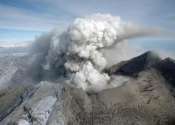Some volcanoes 'scream' at ever-higher pitches until they blow their tops
It is not unusual for swarms of small earthquakes to precede a volcanic eruption. They can reach a point of such rapid succession that they create a signal called harmonic tremor that resembles sound made by various types ...









